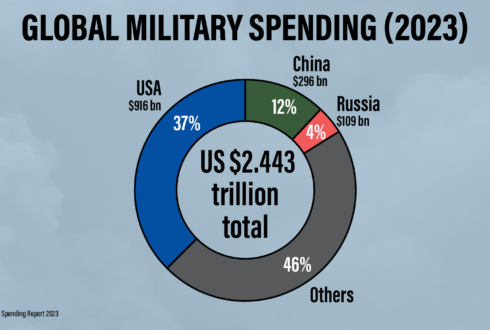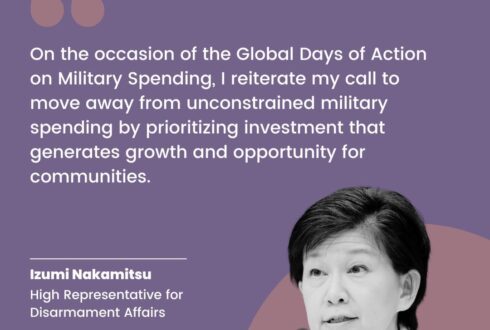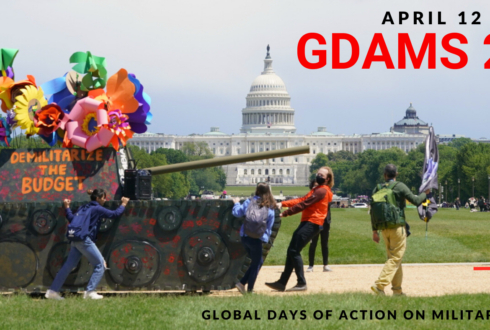GCOMS Statement on the occasion of the 2017 Global Days of Action on Military Spending 18-28 April
All over the world governments are pushing for an increase in military spending. In the U.S.,
Donald Trump has proposed an increase of $54 billion – 10% of the annual allocation, to be paid for by cutting diplomacy and foreign aid. All European governments in NATO agreed twice in Wales and Warsaw to spend 2% of their GDP on defense while in parallel creating new funding systems for military research and development. For its part, China has declared it will increase its military budget by 7% in 2017. Among other top military spending countries, Saudi Arabia and Japan are also planning to increase their military expenditure. Moreover, Trump and the U.S. administration are pushing in this direction, although this is not a new phenomenon.
With this scenario there are plenty of new reasons to renew our call for a cut on military spending (based upon SIPRI data) and to get close to the human security approach that many would prefer to see.
The Global Campaign on Military Spending (GCOMS) is an international campaign founded in December 2014 and promoted by the International Peace Bureau. The aim of the campaign is to push governments to invest money in the sectors of health, education, employment and climate change rather than military. The GCOMS also incorporates the Global Day of Action on Military Spending (GDAMS), which is now in its 7th year.
When Donald Trump says “we have to start winning wars again”, the Global Campaign for Military Spending declare that we must start building peace again. It is urgent that we build human security structures worldwide and at the same time put a stop to war and destruction. Iraq, Afghanistan and Libya are examples of wars that have destroyed countries and their people. What is happening in Yemen and Syria in under our eyes every day and sooner or later someone will ask “what did you do?” The vast majority of humankind desires a peaceful life. War investments boost the revenue of arms companies, but do nothing to ensure decent jobs, good health care and education. Drastically reducing military budgets in all countries will have a two-fold effect. It will reduce the level of militarisation and violence against civilians; and if the money saved is reallocated intelligently, resources can be found for peacebuilding mechanisms, for protecting Human Rights and tackling climate change.
Moreover, this year could be the most deadly in three decades in terms of famine victims. 20 million people are at risk in Yemen, Somalia, South Sudan, and Nigeria. Five years after a famine that claimed a quarter-of-a-million lives, Somalia is back on the brink of catastrophe with 6 million people in need of assistance. Tens of thousands of people in other parts of the world, like in Sri-Lanka, are in need of immediate life-saving support and food assistance. As an international community we are failing to respond to the deadly threats posed by famine. The UN estimates that 5.6 billion dollars are needed to address the famine crisis. It’s time for major government donors to revise their priorities and redirect money from military to human needs.
According to Oxfam’s recent report on “An Economy for the 1%”, the 62 richest people in the world have accumulated as much wealth as the 3.6 billion poorest people, and, during the last five years, the “wealth” of this poorer half of the world has been reduced by 41%. What we see is a predatory system of greed and power, a system that exploits the natural resources and energy of most of the world, and for this the military is the primary tool. For this reason, military spending must be reduced if we want to ensure a fair distribution of natural resources and an effective world decolonization. Since years, as GCOMS, we propose a cut of the 10% of military spending and according with the figures gives by SIPRI this would be enough at least to achieve major individual goals, such as eliminating extreme poverty and hunger.
Refugees and other forced movements of the civilian population are one of the direct consequences of war, inequality and violence. The refugee crisis is being militarized all over the world. Instead of building walls, militarizing borders, ignoring human rights, the main “peace weapons” that we should offer are tolerance, cooperation, global justice and integration. Instead of a military budget, we need a global social budget to address the U.N. Sustainable Development Goals. Instead of the arms business and the militarization of borders, we should respond to the present humanitarian crisis with a real budget to secure and promote human rights.
We need to involve even more citizens and organisations in an open and robust debate on the counter-productive results of military expenditure. More than ever, we need new partners to work on the ongoing Global Campaign on Military Spending (GCOMS), and to make the Global Days of Action on Military Spending (GDAMS) a great success!
Click here to download the French, Spanish and Italian versions.



